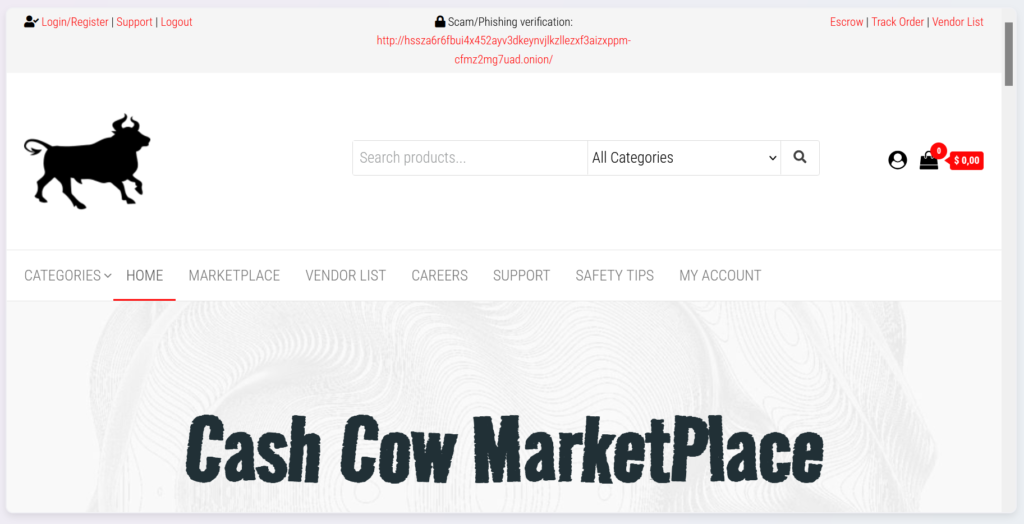Table of Contents
ToggleCash Cow Marketplace – TOR Scam Report (4)
Onion Link: http://hssza6r6fbui4x452ayv3dkeynvjlkzllezxf3aizxppmcfmz2mg7uad.onion/
Scam Report Date: 2024/05/29
Client Scam Report Breakdown
Original Scam Report:
A client reported a scam involving the transfer of Bitcoin to an alleged escrow service. The report stated: “Sent them bitcoin and got nothing, their escrow is false and they don’t have support, also order tracker is fake.” This concise report highlights several critical issues that potential victims need to be aware of, including the fraudulent nature of the escrow service, the lack of customer support, and the fake order tracking system.
Photos:

Defining Terminology and Terms
Bitcoin: Bitcoin is a type of cryptocurrency, a digital or virtual currency that uses cryptography for security. It operates independently of a central bank and can be transferred directly from one user to another on the peer-to-peer Bitcoin network without the need for intermediaries. In this scam, the client transferred Bitcoin with the expectation of receiving a service or product in return.
Escrow Service: An escrow service is a financial arrangement where a third party holds and regulates payment of the funds required for two parties involved in a given transaction. The purpose of an escrow service is to ensure security by keeping the payment in a secure escrow account which is only released when all of the terms of an agreement are met. The report indicates that the escrow service used in this scam was fake, meaning it did not hold the funds securely or facilitate the transaction as promised.
Customer Support: Customer support refers to the services provided by a company to assist customers in making cost-effective and correct use of a product or service. This typically includes help with installation, training, troubleshooting, maintenance, upgrading, and disposal of the product. The report’s mention of the absence of support suggests that once the Bitcoin was transferred, the client had no means of contacting the company for assistance or to resolve the issue.
Order Tracker: An order tracker is a system that allows customers to monitor the status of their order in real-time, from the moment it is placed until it is delivered. It is a tool used by businesses to provide transparency and build trust with their customers. The report’s reference to a fake order tracker implies that the tracking information provided was either incorrect or non-existent, further indicating the fraudulent nature of the transaction.
Analysis and Implications
The client’s brief yet revealing report underscores several red flags commonly associated with online scams. The initial red flag is the fake escrow service. Genuine escrow services act as neutral third parties to ensure that both parties in a transaction fulfill their obligations before the funds are released. A false escrow service, as described in the report, undermines this security, allowing scammers to receive funds without providing the promised service or product.
The absence of customer support is another significant warning sign. Legitimate businesses typically offer various forms of customer support to assist with questions, concerns, and problems. In this case, the client’s inability to contact support indicates a lack of accountability and transparency, which are hallmarks of fraudulent operations. This leaves the client with no recourse to address the issue or recover the lost funds.
Finally, the mention of a fake order tracker points to an attempt to create a facade of legitimacy. Order tracking systems are used to reassure customers by providing real-time updates on their purchases. When these systems are fake, they serve to mislead the customer and give a false sense of security. The combination of a false escrow service, non-existent customer support, and a fake order tracker paints a clear picture of a well-orchestrated scam designed to defraud customers.
In conclusion, the client’s report highlights critical issues that potential victims need to be wary of when conducting online transactions involving cryptocurrency. Understanding the terminology and recognizing the signs of fraudulent activities can help individuals protect themselves from similar scams. Always verify the legitimacy of escrow services, ensure that customer support is available and responsive, and be cautious of order tracking systems that seem suspicious.






